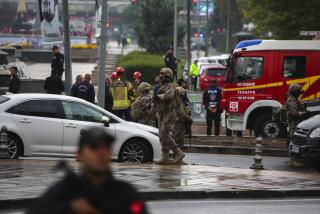Pro-Secular Turkish Journalist Killed in Car Bombing
- Share via
ANKARA, Turkey — A leading pro-secular journalist and academic died Thursday outside his home here after a bomb placed on his car windshield exploded, blowing off one of his arms.
Islamic militants claimed responsibility through the media for the slaying of Ahmet Taner Kislali, triggering fears of renewed political violence in this predominantly Muslim but officially secular nation.
Prime Minister Bulent Ecevit said the bombing was an attack on Turkey’s secularist government and armed forces. “This act of madness will not deter Turkey from its course,” he said.
Kislali, 60, a columnist for the pro-secular newspaper Cumhuriyet, died when he reached for a plastic bag containing the bomb, which Turkish authorities described as a homemade device.
Justice Minister Hikmet Sami Turk confirmed that several Islamic militant groups were suspected in the attack. They include the Great Islamic Raiders of the East--Front, an obscure armed band that was implicated in the 1995 slaying of another well-known pro-secular writer, Onat Kutlar.
Islamic militants had not staged a deadly attack on a prominent opponent since then.
Kislali’s final newspaper column condemned a recent sermon by Mehmet Kutlular, the leader of a nonviolent Islamic fraternity. The sermon claimed that the Aug. 17 earthquake that killed more than 17,000 people in northwestern Turkey was “divine retribution” for the government’s anti-Islamist policies, which include a ban on women wearing Muslim-style head scarves in government offices and state-run universities.
A state security court is trying Kutlular on charges that the sermon sought to incite religious hatred.
Hikmet Cetinkaya, editor in chief of the Istanbul-based Cumhuriyet, said Thursday that most of the newspaper’s journalists have received death threats from anonymous callers. He drew parallels between the Kislali slaying and that of Ugur Mumcu, a Cumhuriyet writer who died in a similar attack in 1993.
Hundreds of demonstrators chanting anti-Islamist slogans kept vigil outside Cumhuriyet offices in Istanbul and Ankara, the capital, after the bombing. Cetinkaya appealed to the crowd in Istanbul to remain calm.
“There are those who will want to provoke you into violence,” he said. “Do not fall into their devious trap.”
Tensions between Turkey’s pro-secular majority and its growing pro-Islamic minority began to surface in earnest when the main Islamist party, Welfare, came to power in 1996. Then-Prime Minister Necmettin Erbakan, the party leader, tried to improve Turkey’s ties with Iran and Libya and end the head scarf ban, but he resigned under pressure from the military after a stormy year in office. Turkey’s highest court later banned Erbakan from politics for five years and shut down his party on charges of trying to introduce Islamic fundamentalist rule.
The Islamists have regrouped as the new Virtue Party and moderated their policies. But a government prosecutor is trying to shut down Virtue too, claiming that its leaders take orders from Erbakan.
Political analysts said Thursday’s bombing could boost popular support for the government’s crackdown on peaceful Islamist movements.
When Virtue Party leader Recai Kutan made a brief statement on an Ankara street condemning Kislali’s killing, angry passersby shouted, “Shut up and go to Iran!”
More to Read
Sign up for Essential California
The most important California stories and recommendations in your inbox every morning.
You may occasionally receive promotional content from the Los Angeles Times.












